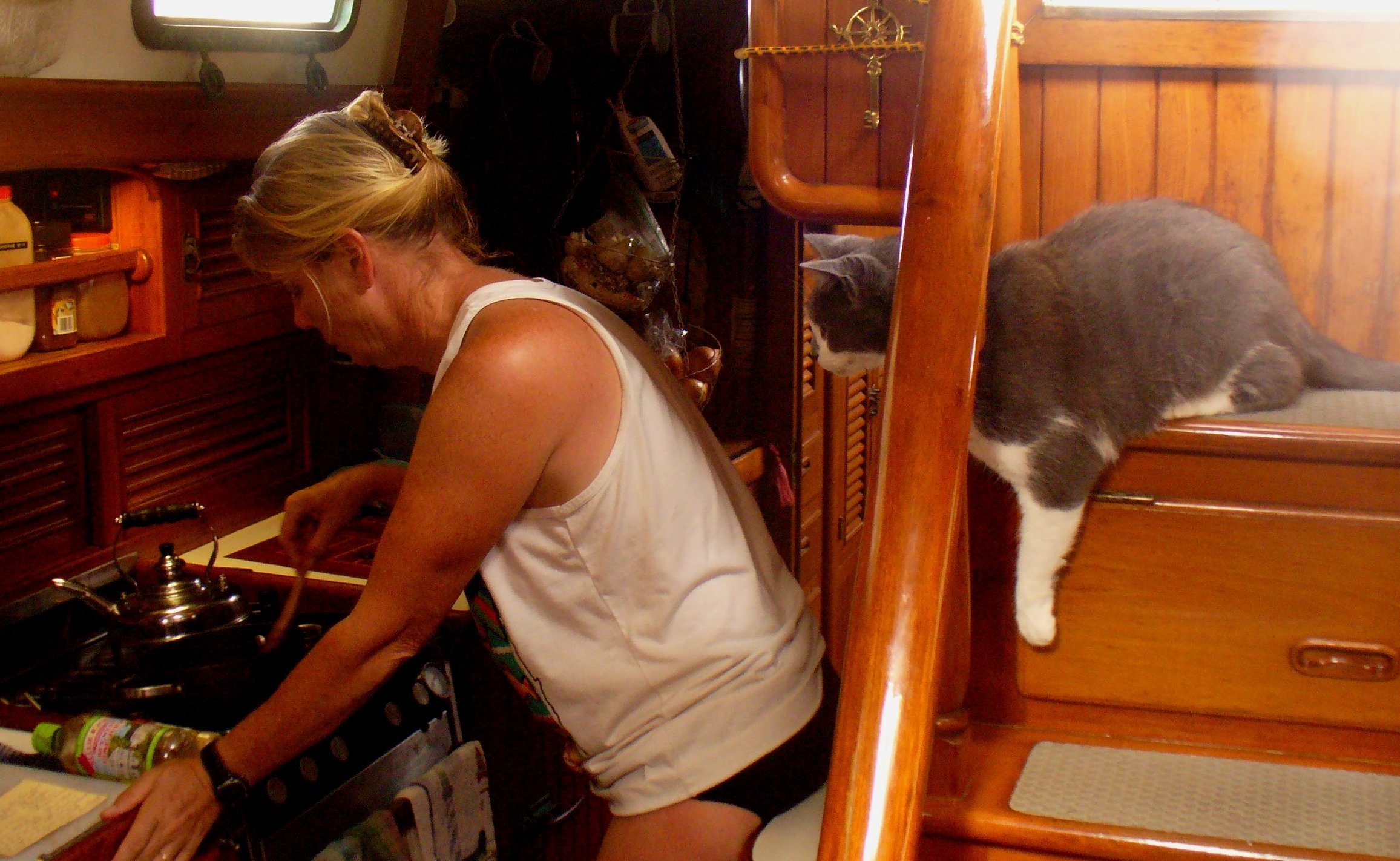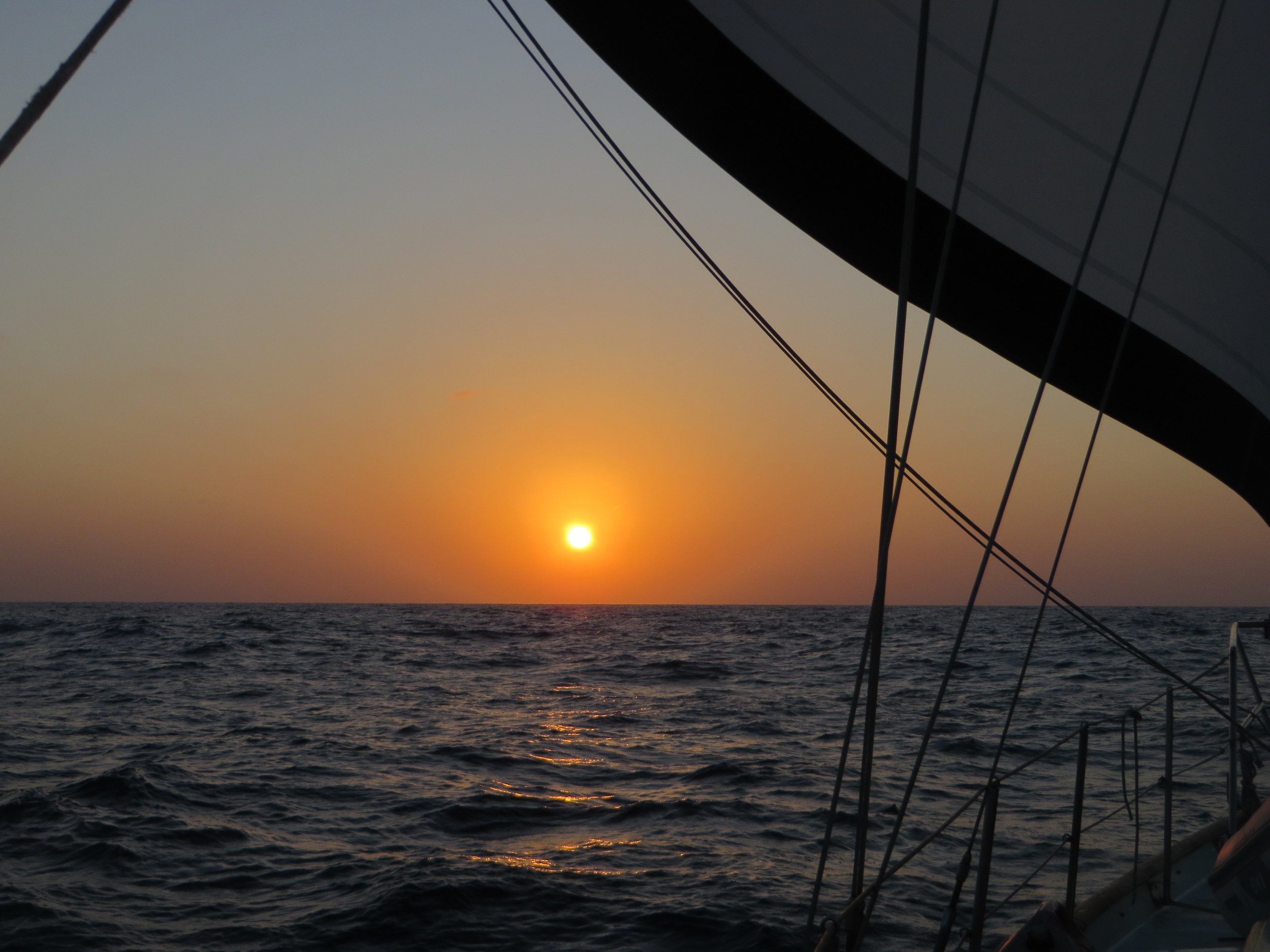Frequently Asked Questions
There are several questions we are asked over and over. We never tire of answering them, but just in case you've thought of these and wanted to know the answers without having to listen to us go on and on and on ... here are the quick responses.
1. How much experience did you have before you moved aboard and set off sailing?
Not very much at all. Unlike some cruisers we know who have sailed with their families since they were children, we never sailed until we were adults. We took a week-long sailing class in San Diego in 1990 and bareboat chartered several times in the Caribbean and southern Florida. When we lived in Denver, we actually bought a sailboat which we kept in the Florida Keys, but we never got to sail it very much (what a surprise!). When we left the dock in Kemah, Texas to cross the Gulf of Mexico, it was our first overnight passage and our first time
being completely out of sight of land.
We sailed off from Kemah, Tx and never looked back
2. If you had limited experience, how did you learn all the things you needed to know?
Living on a sailboat requires a whole new group of skill sets and a different knowledge base and the learning curve is steep. We read a lot! There are a lot of good reference books available. Other cruisers and cruising clubs and organizations are great resources. We attended seminars on subjects of interest like diesel engine maintenance and sail repair. Beyond that, you just have to be willing to try things, be adaptable and very innovative.
3. Do you miss your family?
Of course, we do, but we work hard to stay in touch! We e-mail frequently (via radio...we have SailMail email aboard) and send photos when we have internet in port. While we were circumnavigating, we tried to get home once a year and made the rounds of family visits. We´ve found that the time we do spend with family when we are home is concentrated and high quality... sounds trite, but it´s true.
4. What do you do at night when you´re sailing?
If we´re doing day trips, we simply find a viable anchorage spot and anchor for the night. This is usually planned in advance and not left to luck. When on a longer passage or when no anchorage is available, we continue to sail during the night. One of us is always on watch, so we take turns ... 3 hours on watch, 3 hours off watch. After a couple of days, we get used to the routine and it´s really not that bad. There is no perfect watch schedule that suits everyone. You need to find the sched that works best for the safety and comfort of the crew.
5. How do you cook when you´re under way? Who does the cooking?
First of all, we do have a galley (kitchen) with a 3-burner propane stove and an oven. The stove is gimballed, so when we´re on a heel, it tilts to compensate for the heel of the boat. There are retaining arms on the burners which hold pots and plans in place while I´m cooking. Cooking under way when the weather is foul and the waves are big is a challenge. Things fall out of lockers and sometimes it takes three hands just to retrieve a bowl or access utensils. I usually make big stews and soups (we call it Passage Soup no matter what it is) before leaving on a passage which we can heat easily and eat while we´re trying to get our sea legs. When the weather is calm, we bake and cook regular meals like you´d eat at home except there are no fast or convenience foods. Marcie does most of the cooking. David's the bread and pizza man.
6. What about pirates? Have you ever had any problems?
Nope .. .no pirates ... knock on wood! We´ve heard of instances of pirates off the coasts of Venezuela and Colombia, but we personally have never had any bad experiences ourselves. We have, however, been approached by fishermen during the middle of the night asking for water or food and it many times startles us. We´ve never felt threatened or been accosted. Pirate attack stories spread quickly in the cruising community and we avoid areas of concern as much as possible. That said, in Charleston, SC, we were boarded by some very friendly, polite pirates as part of the Tall Ships Festival. They notified us in advance to make an appointment for boarding!
7. What was the biggest storm you´ve ever encountered and were you afraid?
We've encountered a few bad storms in our sailing career. Our first big blow was a squall off the coast of Florida. We saw the big black clouds approaching, but since we were just sitting down to dinner, we thought we'd wait to "batten down the hatches". Wrong decision! Neptune waits for no one! Dinner ended up on the sole (floor) and we ended up hunkered down in the cockpit, waiting for it to pass. Lesson learned!
Our first real storm was encountered en route from Easter Island to mainland Chile. It seemed to last forever (36 hours). We've seen up to 70 knot/hr winds and big seas in the South Atlantic and Cape Horn area. Most memorable was a trip from NZ's Chatham Islands back to NZ (2011) during which we were pummeled with 60+ knot winds and high seas about 100 miles off East Cape. We suffered our one and only knockdown, blew out our mainsail and bimini and broke a stanchion. Despite all the deafening noise, relentless howling winds and high seas, we never felt life-threatened. Cups is a sturdy, blue water boat and she wants to float. We usually experience one bad storm each year ... not a bad track record actually. Monitoring weather forecasts usually allows us to avoid bad weather.
8. Just the two of you? You must really like each other a lot to spend so much time together.
Well, actually, two is the perfect size crew for our size boat (45´). Though space is tight, we do tend to find our own space when we need "alone time" and we both have our own interests. However, we really do like each other a lot which is convenient under the circumstances.
9. How long did you continue to sail?
When we left in 2000, we said we´d cruise for 10 years. We finally sold Nine of Cups in 2018.
10. What was your longest passage?
To date, our longest single passage has been from Cape Town, South Africa to Charleston, SC, USA - a total of 7,150 nautical miles (73 days), although we did make stops at both St. Helena and Ascension Island along the way. 43 days is the longest passage without stopping (Ascension Island to Charleston, SC,USA).
11. How much food and water do you carry
We have two 60-gallon tanks for fresh water, but we have a watermaker aboard which converts sea water to fresh water via a process called reverse osmosis, so water storage isn`t as critical for us as it was for sailors long ago (as long as the watermaker is working, of course). Depending on the length of passage, we usually carry at least 30 days of food for two people. When we crossed the Pacific, we carried nearly six months worth of food, home-canned chicken and turkey and we fished a lot. Provisioning is an art unto itself and we've discussed it lots over the years.
12. What´s your favorite port of call so far?
That`s a hard question because each place is unique unto itself and holds it own special allure. For sure, Cartagena, Colombia is near the top of the list as the most beautiful city. Our inland trip to Macchu Pichu in Peru was fantastic. The trip to Antarctica was other-worldly. Stopping at Pitcairn Island was the stuff dreams are made of. However, sometimes simply watching a sunset is awe inspiring.
13. What's your annual budget living on the boat?
This is an interesting question because we read about cruisers all the time who say they can live aboard for $10K per year or less. Wow ... that's impressive! We spend ~$35K/year and we don't think of ourselves as extravagant. When comparing budgets, we reckon we figure our annual costs differently to arrive at such a higher figure, this is what we've come up with.
These folks are "sabbatical cruisers", only cruising for a year or two and have already made their pre-passage investments and will make no major investments in sails, haul-outs, new engines, wind gens, refits, etc. during their cruising time which really weigh heavily on the budget.
They don't include things like side-trips, souvenirs, trips home, boat insurance, health insurance, etc. For us, it's part of the cost of living aboard and we include everything. Every expense from boat maintenance to postcard stamps are accounted for.
14. Why do you cruise?
Freedom, travel, a new way to look at life. David's dream had always been to sail into the sunset. He just never really verbalized it to Marcie and the thought of "selling up and sailing off" had never even occurred to her. She was, however, game for a new adventure and this was just one more to experience. David loves the sailing. Marcie loves the travel. It's a good way to see the world, experience places and cultures we'd never see otherwise and bring your "home" with you.
15. What are the procedures for arriving in a new country?
Each country is different. Some require advance notice of arrival (e.g. Fiji, NZ, Australia). Others require you to notify them as soon as you enter their territorial waters (e.g. Chile). Some require visas in advance (Australia) while others grant visas upon arrival. We research the requirements in advance and then just follow directions. When approaching a new country, there's usually instructions to contact the Port Captain or other agency who will arrange all arrival formalities for the crew (Immigration) and the boat (Customs/Quarantine, etc). All the information is readily available, it just takes some pre-planning to comply.






